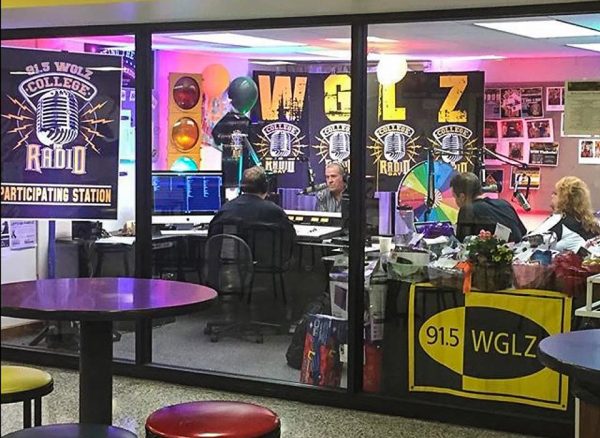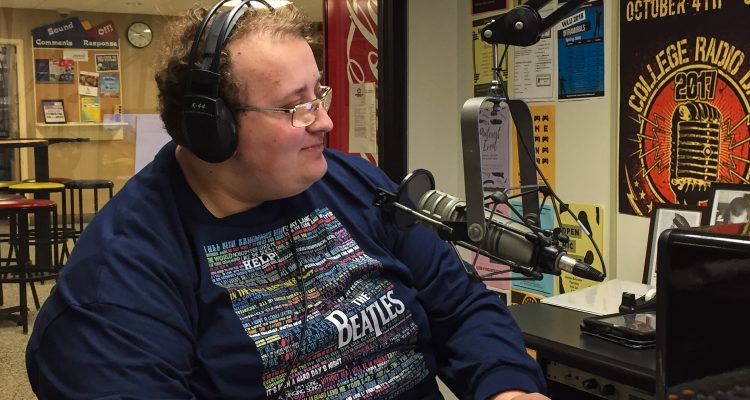The original transmitter back in the early 1990s appeared to be from the 1970s, actually, but that’s what Chris Lee had to settle for when optimizing his TV and radio budget at West Liberty University.
On the second floor of the Student Union, there was a small office space for student managers as well as a studio, one equipped with the technology available during the era. Two turntables, one CD player, and a cart machine permitted students and professors to play tunes from 8 a.m. into the evening hours while classes were in session.
But these days, Walker Polivka, who serves as station manager, and his fellow radio production students need only one computer system for every sound involved.
“Boy, oh boy, has the technology moved forward from those days,” Polivka said with a laugh. “At this point, all we need is the computer system that we have, and that takes care of the what we need. We have the software we need, of course, and that allows us to have the music up and running 24 hours a day.

“Unfortunately, we are off the air during the summer months, but that’s a condition that’s included in the FCC license that we have,” he continued. “We have been and have always been a 150-watt station, but up on that hilltop it surprised everyone how far our signal travels, especially on those clear nights.”
Polivka is a sophomore broadcasting student at West Liberty, a native of Shadyside and a 2016 graduate of Bridgeport High School. When he first arrived on the hilltop campus, he knew broadcasting was the field of study he wished to explore but did not know where it would lead him.
“I knew about the broadcasting program at West Liberty, but I had no idea what it would entail. I didn’t know if it would involve radio or television and if it would involve being on air or off air,” he explained. “I really had no idea, so I just walked into it pretty much blind. But one of the class requirements of the radio production class was a weekly hour-long segment on the radio, and that’s when I figured it out.”
Not only did Polivka earn a $3,000 scholarship, but he also applied for and won a $1,000 grant for WGLZ 91.5FM. The Spirit of Radio Award was accepted from the College Radio Foundation. The station manager was awarded the Abe Voron Award after explaining his effort to advance the campus frequency to a new level in college broadcasting.

“The association has a number of different scholarships that are awarded each year, and some are for radio, some TV, and others are for the production aspects of both those broadcasting venues,” Polivka explained. “The scholarship that I received is intended each year for a student who is planning a career in radio, and I was lucky enough to be honored with that particular scholarship.
“And the radio station received a $1,000 grant from the College Radio Foundation, and what we had to do is explain what we have accomplished in the past and what we plan to do in the future,” he said. “Most likely we will be using our grant money to get new speakers for our studio.”
WGLZ features mostly a Top 40 format with student disc jockeys behind the mic each day of the academic week, but that changes when Polivka approves special programs during each semester.
“Our basis is Top 40, so anyone listening will hear today’s top hits, but we also have some other genres that are involved, as well,” he said. “We do have a little of everything. The music from the 1970s is involved, and so is the music from the decades ever since.
“We also have had rap, hip-hop, the oldies, country, and big band. Pretty much everything can be heard on WGLZ at any given time,” Polivka continued. “Top 40 is still the main format, but we mix it up depending on who’s hosting the show. We also have segments that included unsigned artists, and they are musicians who do not get much recognition. But we play them because so many of them are really, really good.”

Instead of the radio station being hidden away on the building’s second floor, WGLZ is now front and center on the first floor in an area where hundreds of students, faculty members, and administrator gather each day.
“And we do notice when people are looking into the station, especially when it’s really crowded at the times when everyone is eating something for a snack or for lunch or dinner,” Polivka said. “At different times, our station is on the union’s speaker system, but there are times when we’ve been asked to turn it off because something else is taking place inside that building.
“The Student Union is really different than it used to be when WGLZ was founded,” he said. “There used to be a pub and bowling alleys on the bottom level, but that’s all changed these days. The area where the bowling alleys were is now the campus post office, and where the former pub area now has a place to get something to eat. The bookstore, though, is still where it’s always been.”
Jeff Pfister serves as the college station’s faculty advisor, and Polivka does take to the hilltop airwave at least once per week. His show is interview based and features guests from the Wheeling area as well as well as people involved with pressing national issues.
He wishes to continue in the broadcasting industry once he earns enough credits for his undergraduate degree.
“I hope to stay local when I get started, and I am open to every possibility to get my career started. Of course, I have a couple of years of school before that can happen, but I am already looking forward to that part of my broadcasting career,” Polivka said. “But we will see where I end up. I would love to be able to move up to a bigger market, but not a market that’s really, really big. I’m just not that interested in the L.A.s or the New Yorks, I guess.
“I would really like it if an opportunity was available at some point in the Pittsburgh market. Not too far away from home, great culture, and of course, the professional sports in Pittsburgh attracts a lot of attention. But, I’m only a sophomore and have a long way to go before something like that can become a reality.”
(Photos provided by Walker Polivka)



